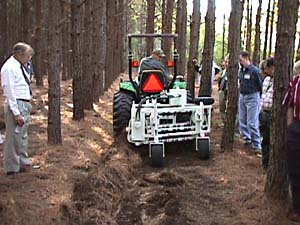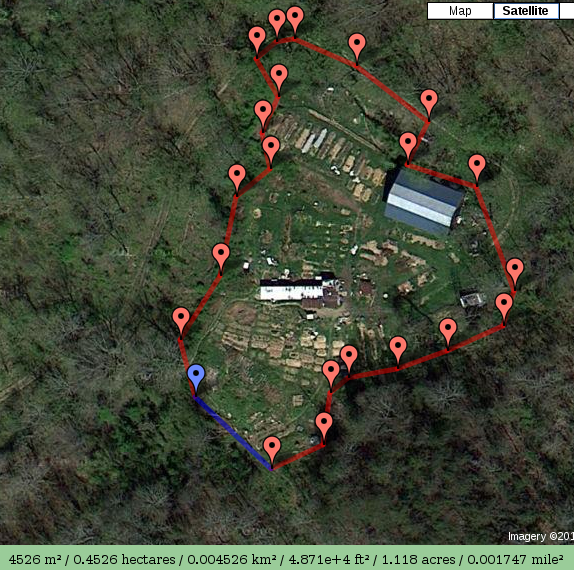
Growing your own mulch with pine trees
 My
favorite part of Sara McDonald's One
Acre Homestead was
the idea of
growing our own mulch by planting a small pine plantation. Sara
notes that a 10-year-old pine forest can produce 125 to 200 bales of
needles per acre, with each bale covering 120 square feet (and with
yields increasing as the trees mature further). You should give
the trees two years off between mulch-gathering, though, so I estimate
my blueberry patch would need the mulch from about 0.3 acres filled
with 21 white pines.
My
favorite part of Sara McDonald's One
Acre Homestead was
the idea of
growing our own mulch by planting a small pine plantation. Sara
notes that a 10-year-old pine forest can produce 125 to 200 bales of
needles per acre, with each bale covering 120 square feet (and with
yields increasing as the trees mature further). You should give
the trees two years off between mulch-gathering, though, so I estimate
my blueberry patch would need the mulch from about 0.3 acres filled
with 21 white pines.
 For the last six years, Mark
and I have been focusing on what
permaculture practitioners refer to as zones 1 and 2 and what I call
our "core homestead," which covers a bit over one acre. I do
have visions for forest pastures ringing our core
homestead...eventually...and I could see a pine pasture doing
double duty as mulch producer and shady summer chicken pasture.
On the other hand, we've still got areas within our core homestead that
haven't quite been reclaimed from the weeds and turned into productive
growing space, and those areas always come first.
For the last six years, Mark
and I have been focusing on what
permaculture practitioners refer to as zones 1 and 2 and what I call
our "core homestead," which covers a bit over one acre. I do
have visions for forest pastures ringing our core
homestead...eventually...and I could see a pine pasture doing
double duty as mulch producer and shady summer chicken pasture.
On the other hand, we've still got areas within our core homestead that
haven't quite been reclaimed from the weeds and turned into productive
growing space, and those areas always come first.
Still, I'll be adding
the pine tree idea to other options I've tossed around for growing our
own mulch. Oats
as a fall cover crop
work well for the beds they're planted on and chop-'n-drop species are possibilities in
the forest garden. Meanwhile, I'll just keep raking
leaves out of the woods, flagging down the wood chip guys whenever I see them,
and buying straw. What's your favorite
way to complete the loop with farm-grown mulch?
Want more in-depth information? Browse through our books.
Or explore more posts by date or by subject.
About us: Anna Hess and Mark Hamilton spent over a decade living self-sufficiently in the mountains of Virginia before moving north to start over from scratch in the foothills of Ohio. They've experimented with permaculture, no-till gardening, trailersteading, home-based microbusinesses and much more, writing about their adventures in both blogs and books.
Want to be notified when new comments are posted on this page? Click on the RSS button after you add a comment to subscribe to the comment feed, or simply check the box beside "email replies to me" while writing your comment.

My father had an acquintaince in New Zealand, a Dutch farmer who had emigrated. That man had pines growing on a portion of his land as his retirement fund.
If you have enough land and if the cutting is sensibly managed (a tree here and there instead of cutting down a whole lot) it could be a source of extra income and maybe a source of sawdust for your toilet. And maybe leftovers could be used as firewood. Does your wood stove have a problem with resin-rich wood?
I admit that this idea arose out of my aesthetic preference for pines. I planted pines first, then put the blueberries in next to them and maybe only after transplanting both did I realize "hey, this could work really well." I've also seen the wild blackberries grow well under pine trees.
I haven't heard about limiting microbial activity (though I think it makes sense, especially when fresh, because of the terpenes.) One reason they are recommended for gardens (particularly acid-loving plants) is because they have very low allelopathy compared to many other trees. I know a lot of folks immediately think of black walnut, but many trees suppress other plants to some extent, and pines do not.
In response to your question, Anna, I recently discovered a nice source for compost and mulch where an oak tree has been littering on a concrete slab near the old milk barn for decades. There's about 8 inches of rich compost under the top layer of recently fallen leaves. Since it's up on a slab, it's been out of the way of weeds. It seems perfect. Other than planning to use that, I've been using hay bales from the fields. It's not my favorite mulch, but it's free and abundant and it's working out so far. I'm careful about which bales I use so that they aren't too weedy. If there is any grass seed that germinates, it's usually easy to pull out of a thick layer of mulch.
I enjoyed reading everyone's free mulch ideas!
Cheerful Agrarian --- I haven't seen any problems from using pine needles as a mulch on blueberries, but I'm not explicitly trying for microbial activity in the mulch layer. I might tend to agree with you that they wouldn't be a good addition to compost. Another factor to consider is acidity --- pine needles might acidify the ground too much for plants that like the soil sweeter.
Roland --- In our area, people who plant trees for lumber tend to aim for hardwoods, primarily oaks and walnut. Pine can be dicey in a wood stove if you use too much (although it does make great fire starter). Some other mulch-producing trees I've considered planting are the maples, which would make good firewood (especially sugar maples) and quality leaf mulch (especially silver maples).
I have many oak and sweetgums on 3 acres. So far I have harvested almost 10 yards of leaves with almost that much patiently waiting. After a quick trip through the shreader 3-4 inches get worked into garden beds with a bit of manure to breakup hardpan clay. Since we have trees where we plan on putting the garden we had to cut about 20 trees, both large and small resulting in large pile of small branches for mulch and possible bugul beds for future forest garden. A lot of work but time is free when you can find it.
Thanks for the encuragement.